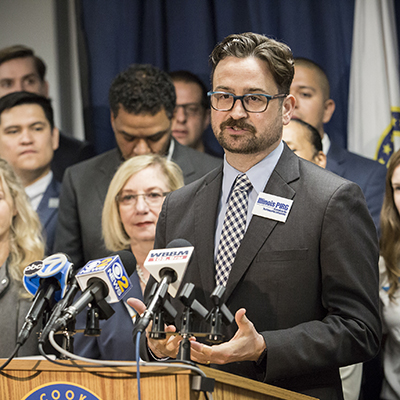
Why we oppose lifting the nuclear construction moratorium in Illinois
Instead of chasing expensive, speculative technology, Illinois should focus on proven clean energy solutions.
Over the summer, Gov. Pritzker vetoed legislation that would have lifted the Illinois moratorium on construction of new nuclear power plants. We opposed the legislation and applauded the veto.
- Safety: the current moratorium is in place until the federal government “has identified and approved a demonstrable technology or means for the disposal of high level nuclear waste.” No such technology or means has been identified or approved. With our large number of reactors, and no federal solution in sight, Illinois is already set to store large amounts of nuclear waste. We should not make this problem worse.
- Cost: Nuclear power is expensive and its high cost has negatively impacted Illinois for decades. Construction of the Illinois reactors in the 70’s and 80’s was beset by cost overruns and delays. That lead to skyrocketing electric rates and severe cost-cutting at ComEd, causing reliability problems that lasted decades. Solving those reliability problems was even one of the public justifications for passing the “formula rate” law in 2011 at the outset of the ComEd bribery scheme. Illinois has now passed two bailouts to prop up the nuclear plants because they cannot compete on price. There are simply more cost effective ways, with proven technologies, to hit Illinois’ clean energy goals.
- Distraction: The nuclear industry has long overpromised and under-delivered. The expensive technology was promised to be “too cheap to meter.” SMNRs are the latest incarnation of promised breakthroughs – but the technology remains speculative. Just yesterday, NuScale, the only company that has gotten federal approval for an SMNR reactor design, announced it was scrapping a planned project facing spiraling costs. A recent report on the project from the Institute for Energy Economics and Financial Analysis identified large cost overruns. As one study author said, “If it sounds too good to be true, it probably is.” Lifting the moratorium now, putting state resources towards regulation and study, and other impacts from chasing the latest nuclear hype is a distraction from pursuing more proven, effective clean energy solutions.
Topics
Authors
Abe Scarr
State Director, Illinois PIRG; Energy and Utilities Program Director, PIRG
Abe Scarr is the director of Illinois PIRG and is the PIRG Energy and Utilities Program Director. He is a lead advocate in the Illinois Capitol and in the media for stronger consumer protections, utility accountability, and good government. In 2017, Abe led a coalition to pass legislation to implement automatic voter registration in Illinois, winning unanimous support in the Illinois General Assembly for the bill. He has co-authored multiple in-depth reports on Illinois utility policy and leads coalition campaigns to reform the Peoples Gas pipe replacement program. As PIRG's Energy and Utilities Program Director, Abe supports PIRG energy and utility campaigns across the country and leads the national Gas Stoves coalition. He also serves as a board member for the Consumer Federation of America. Abe lives in Chicago, where he enjoys biking, cooking and tending his garden.
Find Out More

Testimony in Opposition to HB5589 before the Energy & Environment Committee

